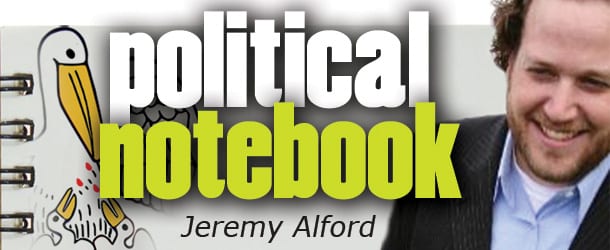After failing to pass a medical marijuana bill last year, state Sen. Fred Mills, R-Parks, is telling supporters he will return in 2015 with legislation that focuses on different applications, like oils and pills.
Danny Ford, lobbyist for the Louisiana Cannabis Industry Assoc., said narrowing the focus of such a proposal is a smart move.
“We’ve got to find a way to get something passed,” he said. “We’re excited about further exploring both the medicinal and agriculture sides of this issue.”
Ford said LCIA will also gear up next year to help educate the candidates for governor and learn their stances on various issues.
Special Legislative Elections Set
Before politicos can turn their collective attention away from the recent federal elections and toward next fall’s statewide races, a trio of legislative seats are up for grabs. They’ve been added to a special February ballot.
Against this backdrop, there’s a great deal of positioning and maneuvering already underway for the regular legislative elections that will be held in October, 2015. It’s an early indication that the 2015 cycle will be busy and jam-packed with candidates.
The latest special election called in the Louisiana Legislature will also open up seats on two of its most important committees.
Rep. Simone Champagne, R-Erath, has announced she will resign from the lower chamber on Dec. 31. In January, Champagne will become the new chief administrative officer for the city of Youngsville.
Her move creates high-profile vacancies on the House Appropriations Committee, which is charged with crafting the state budget, and the House Education Committee, which will oversee Common Core hearings next year.
A special election for House District 49 has been set for Feb. 21, with a runoff, if needed, on March 28. Qualifying begins Jan. 7.
Already, there are three possible candidates looking to run. They include Blake Miguez, who appeared on the History Channel’s show Top Shot and works with the Political Firm. Miguez has already raised nearly $60,000, with a goal of raising $100,000 by the end of 2014. The political action committee of the Louisiana Oil and Gas Assoc. is behind him.
Other candidates said to be gearing up are Iberia Parish Councilman Roger Duncan and John Bering, who has run before and is already campaigning.
Two other legislative races are set for Feb. 21:
— In House District 8, Rep. Jeff Thompson, R-Benton, is stepping down to become a judge. The biggest splash made so far for the resulting special election comes from constitutional law attorney Mike Johnson, who has picked up an endorsement from Congressman John Fleming, R-Quitman. Another possible candidate is Duke Lowrie, a retired fireman who lost to Thompson in 2011.
— In House District 66, Rep. Hunter Greene, R-Baton Rouge, was elected as a judge this fall. And Baton Rouge Metro Councilman Buddy Amoroso has announced he’s running.
With Speaker Chuck Kleckley, R-Lake Charles, term-limited from filling House District 36 again, a recognizable name has already surfaced for the developing October race there. Dr. Keith DeSonier, chairman of the Louisiana State Medical Society’s Council on Legislation, is in the running. Sources say he announced his intentions to the LSMS board in September. He’s working with consultant Randy Hayden.
After dropping out of the 6th Congressional District during the primary, Baton Rouge attorney Cassie Felder is already considering another run next fall. She has her sights set on House District 69, which is occupied by Rep. Erich Ponti, R-Baton Rouge. “It’s a possibility,” Felder told LaPolitics.
Here are a few other legislative races developing:
— In House District 37, Rep. Johnny Guinn, R-Jennings, could have some competition. Sources say Lance Armentor, a director at Jennings American Legion Hospital, is looking closely at the 2015 race. He’s a Republican activist and a respected community advocate.
— In Senate District 12, which is being left vacant by term-limited state Sen. Ben Nevers, D-Bogalusa, Hammond Mayor Mayson Foster, a Republican, is said to be mulling it over. With $250,000 to $300,000 needed for the race, money is said to be a major factor in his decision-making. Already announced for that race are Beth Mizell, a Republican from Franklinton who ran against Nevers last cycle, and Rep. Harold Ritchie, D-Bogalusa.
— In Senate District 36, now filled by term-limited Sen. Robert Adley, R-Benton, there are two potential contenders. Rep. Henry Burns, R-Haughton, and fellow Republican, Richey Jackson, director of the Bossier-Webster Parish Truancy Center, are lining up to run.
Want to learn about the other developing legislative races? LaPolitics is tracking them all. Check out our new 2015 Legislative Races page.
Budget Debacle Just Starting
How will lawmakers deal with a $1.4 billion budget hole next year?
For starters, Commissioner of Administration Kristy Nichols said that the current spending and hiring freezes could either be expanded or continued into the next fiscal year. “That is a possibility,” she said.
Either way, it probably won’t be enough to protect higher education from what could be its most treacherous session in recent memory. That’s because funding for higher education and health care, about one-third of the budget and the most accessible for cuts, may be treated differently than in the past.
Constitutional amendments approved by voters last month will help protect Medicaid money and remove some areas of health care from the cutting board. That makes the budget situation even bleaker for the next governor when he takes over in 2016.
Lawmakers, meanwhile, are on the 2015 ballot. That will certainly factor into their votes during the spring session.
The field running for governor should be ready to address the situation soon, politicos say. The victor of the race should be prepared for a tough honeymoon.
“Anyone running for governor may as well face up to it,” said Dr. Jim Richardson, a member of the Revenue Estimating Conference and an economist at Louisiana State University. “Their first year will be hard. There won’t be any buckets of money or pockets of cash left over to patch the holes. They need to figure out how to spend and how to have sufficient funds on a sustainable basis.”
There are some long shots, like a new Internet sales tax. According to Greg Albrecht, the state’s chief economist, the state is losing out on anywhere between $250-800 million by skipping taxes on online sales, depending on the study you want to believe.
Even though Gov. Bobby Jindal opposes taxes in all forms, creating a new Internet sales tax would mean a “material increase in taxes,” said Albrecht, adding, “on the federal level efforts to address this are slowing down.”
That’s why, reports Bloomberg, a dozen incumbent and newly elected governors are calling on Congress to allow states to collect an Internet tax on purchases. Jindal isn’t among those pushing for the authority.
In Lake Charles, a new $700 million casino is open and providing hundreds of new jobs. It could provide a nice bump in gaming revenues for the state. “But will it grow the market or cannibalize it?” asked House Speaker Chuck Kleckley, R-Lake Charles.
Commissioner of Administration Kristy Nichols told LaPolitics the $178 million surplus identified by her office can still be certified in January by the Revenue Estimating Conference, whether as an actual surplus or as something else. If it is, it can be appropriated by lawmakers for the 2015-16 budget. Treasurer John Kennedy questions the validity of Nichols’ estimate.
How the administration transforms the non-recurring money into recurring revenue for the budget is another question. But they’ve managed to do it in the past using pass-throughs and other tactics.
“It’s going to be a real challenge because so much of the projected deficit will have to be replaced with real dollars,” said Albrecht.
Are more cuts possible this fiscal year?
The administration has presented a plan to address a $180 million shortfall in the current fiscal year budget, but the drama is far from over.
The Joint Legislative Committee on the Budget still has to approve the plan at a meeting that hasn’t yet been scheduled.
While a patchwork of financing protects higher education and health care from immediate cuts, there’s another burning question heading into the final six months of the fiscal year. Could the economic picture get worse?
The Revenue Estimating Conference (REC) is charged with determining how much money the state has to spend, which in turn determines how much needs to be cut. They can choose between two different sets of predictions: one from the Legislative Fiscal Office (LFO) or another from the Division of Administration (DOA).
REC members, as per tradition, went with the more optimistic forecast, which came from the LFO this go-around. The other forecast from the DOA was far worse, and has lawmakers nervous. Even Senate President John Alario, R-Westwego, admitted the numbers may have to be adjusted again when the REC next meets in January.
The Division of Administration’s economist proposed a downward revision of $226 million for the current fiscal year, which is $55 million more than the LFO forecast. For next fiscal year, the REC went with a $201 million revenue reduction from the LFO, as opposed to a $342 million reduction from the DOA.
Oil prices are a big reason reductions are needed in both budgets. The LFO projections were more conservative than the DOA’s on this front.
However, forecasts for individual income taxes, the other major factor on the table, offered a stark contrast. The original forecast for this fiscal year called for $2.9 billion in collections. LFO recommended a decrease of $63 million, while DOA suggested cutting these revenues by $130 million. The forecast for next fiscal year was for $3.1 billion in individual income tax collections, with LFO recommending a decrease of $120 million and DOA proposing $243 million.
At some point, it’ll become clear which estimate was more wrong. Lawmakers and the administration, to be sure, hope the REC made the right choice.
For more Louisiana political news, visit www.LaPolitics.com or follow Jeremy Alford on Twitter @LaPoliticsNow.














Comments are closed.